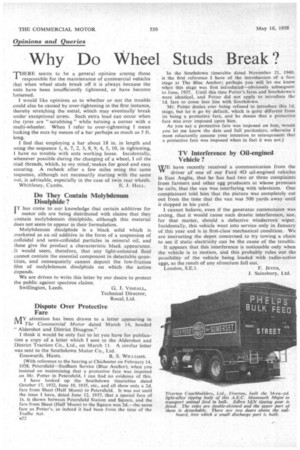Why Do Wheel Studs Break?
Page 56

If you've noticed an error in this article please click here to report it so we can fix it.
THERE seems to be a general opinion among those L responsible for the maintenance of commercial vehicles that when wheel studs break off it is always because the nuts have been insufficiently tightened, or have become loosened.
I would like opinions as to whether or not the trouble could also be caused by over-tightening in the first instance, thereby stretching the metal, which may eventually break under exceptional stress. Such extra load can occur when the tyres are " Scrubbing " while turning a corner with a multi-wheeler. When I refer to over-tightening I mean locking the nuts by means of a bar perhaPs as much as 5 ft. long.
1 find that employing a bar about 18 in. in length and using the sequence 1, 6, 7, 2, 3, 8, 9, 4, 5, 10, in tightening, I have no trouble with nuts working loose. Incidentally, whenever possible during the changing of a wheel, I oil the stud threads, which, to my mind;makes for good and easy securing. A recheck after a few miles using the same sequence, although not necessarily starting with the same nut, is advisable, especially in the case of twin rear wheels.
Whittlesey, Cambs. E. J. HALL.
Do They Contain Molybdenum Disulphide ?
IT has come to our knowledge that certain additives for I motoroils are being distributed with claims that they contain molybdenum disulphide, although this material does not seem to appear in their formulation.
Molybdenum disulphide is a black solid which is marketed as an oil additive in the form of a suspension of colloidal and semi-colloidal particles in mineral oil, and these give the product a characteristic black appearance. It would seem, therefore, that any light-coloured fluid cannot contain the essential component in detectable quantities, and consequently cannot deposit the low-friction film of molybdenum disulphide on which the action depends.
We are driven to write this letter by our desire to protect the public against specious claims.
Swillington, Leeds. G. J. VINEALL,
Technical Director, RocaI, Ltd.
Dispute Over Protective Fare
k Ay attention has been drawn to a letter appearing in 1" The Commercial Motor dated March 14, headed "Aldershot and District Disagree."
I think it would be only fair to let you have for publication a copy of a letter which I sent to the Aldershot and District Traction Co., Ltd., on March 11. A similar letter was sent to the Southdown Motor Co., Ltd.
Emsworth, Hants. B. S. WILLIAMS.
[With reference to the hearing at Chichester on February 14, 1958, Petersfield—Stedham Service (Blue Anchor), when you insisted on maintaining that a protective fare was imposed on Mr. Potter in Petersfield, I can find no evidence of this.
have looked up the Southdown timetables dated October 17, 1932, June 10, 1935, etc., and all show only a 2d, fare from Sheet (Half Moon) to Petersfield. It was not until the issue I have, dated June 12, 1937, that a special fare of Is. is shown between Petersfield Station and Square, and the fare from Sheet (Half Moon) to the Square was 2d.--the same fare as Potter's, as indeed it had been from the time of the Traffic Act.
'W22
In the Southdown timetable dated November 21, 1940, is .the first reference I have of the introduction of a fare stage at The Blue Anchor; perhaps you will let me know when this stage was first introduced—obviously subsequent to June, 1937. Until this time Potter's fares and Southdown's were identiCal, and Potter did not apply to introduce the lcl. fare to come into line with Southdown.
Mr. Potter denies ever being refused to introduce this ld. stage, but let it go by default, which is quite different from its being a protective fare, and he denies that .a protective .fare was ever imposed upon him.
As you say a protective fare was imposed on him, would you let me know the date and full particulars,otherwise f must reluctantly assume your intention to misrepresent that a protective fare was imposed when in fact it was not.]
TV Interference by Oil-engined Vehicle?
Ivhave recently received a communication from the driver of one of our Ford 40 oil-engined vehicles in East Anglia, that he has hadtwo or three complaints from farmers and other egg producers at whose premises he calls, that the van was interfering with television. One complainant told him that the picture was completely cut out froth the lime that the van was 500 yards away until it stopped in his yard.
I cannot believe, even if the generator commutator was arcing, that it would cause such drastic interference, nor, for that matter, should a defective windscreen wiper. Incidentally, this vehicle went into service only in January of _this year and is in first-class 'mechanical condition. We are instructing the depot concerned to try towing a chain to see if static electricity can be the cause of the trouble.
It appears that this interference is noticeable only when the vehicle is in motion, and this probably rules out the possibility of the vehicle being loaded with radio-active eggs, as the result of any strontium fall out.
London, S.E.1. F. IEYES, I. Sainsbury, Ltd.




































































































